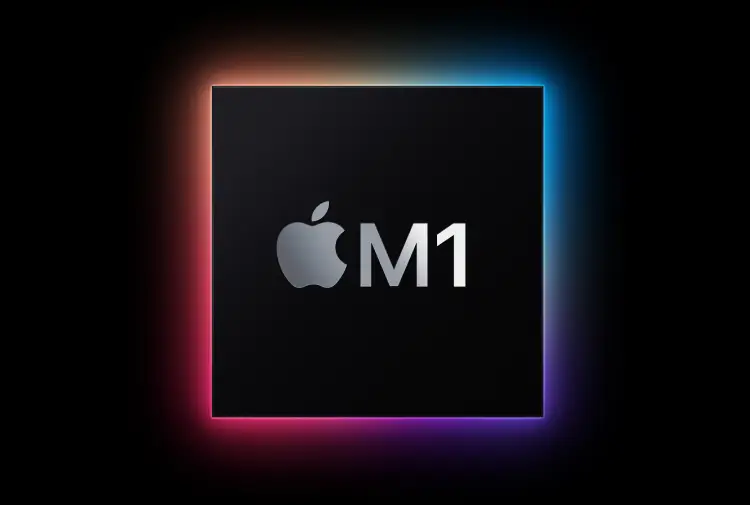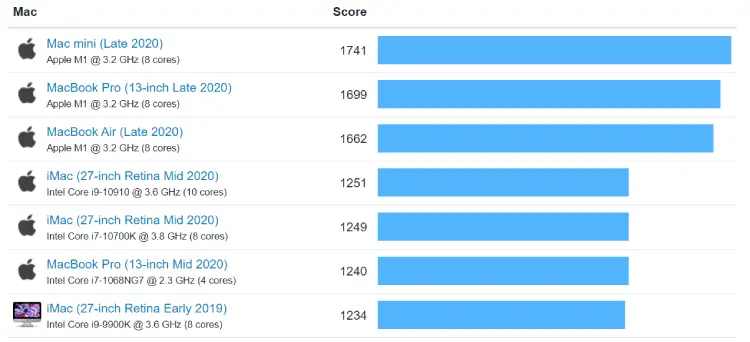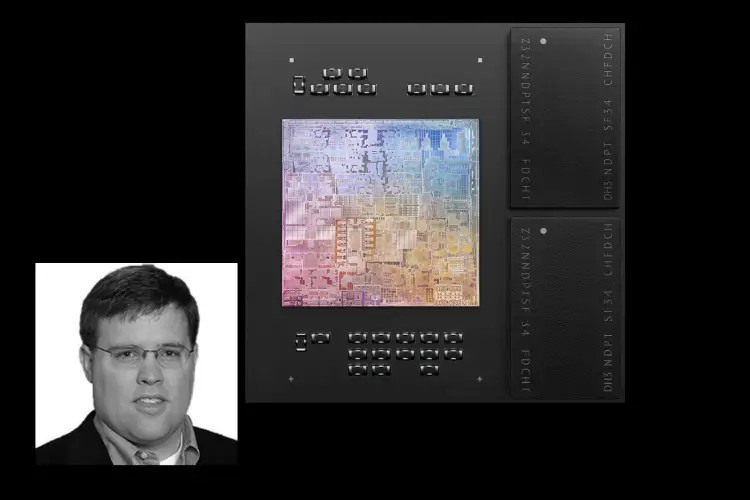
New products from Apple always generate plenty of hype regardless of their merits, but the announcement that the tech giant is building its own Arm-based PC processor could have real and long-lasting ramifications for the silicon industry.

Apple used its One More Thing event to launch the M1, a new Arm-based chip that will be used in three upcoming devices; the MacBook Air, MacBook Pro, and Mac Mini. Apple has previously used Intel-based chips in its PCs while favouring Arm designs for its mobile devices, and the announcement marks the start of a decoupling from Intel, which will see all its devices switch to Arm over the next two years.
“There has never been a chip like M1, our breakthrough SoC for the Mac,” claimed Johny Srouji, Apple’s senior vice president of hardware.
“You could see for a while that Apple would want to move this internally, just like they have done with other processors, but the conditions haven’t been right,” says Jon Erensen, senior research director at Gartner.
“Intel has struggled over the last couple of years with some of their manufacturing, and this has presented an opportunity for Arm, which has been able to narrow the performance gap.”
The Apple M1: a speed demon
According to Apple, the M1 will offer a 3.5x CPU performance and 6x GPU performance boost, and enable the new machines to enjoy double the battery life of their predecessors. Early impressions of the chip suggests it is fast; scores from GeekBench, which benchmarks CPU performance, show all three devices running the Apple M1 easily outperform other Macs on the market (GeekBench uses the Intel Core i3-8100 processor, which scores 1,000, as its baseline for comparison).

Data released on Monday also shows an M1 beating other Apple devices when running Rosetta 2, the company’s emulation software which is required to translate programmes designed for x86 architecture to run on Arm-based machines.
The processor, tested in a Macbook Air, achieved a score of 1313. This is perhaps more significant as the Apple M1 will, at least initially, be predominantly running applications designed with x86 chips in mind.
While it remains to be seen if this kind of performance is achievable in real-world settings, the move to Arm designs by Apple could have wider implications.
Big Tech meet Big Silicon: what next for Intel?
Apple is the latest tech giant to announce a renewed focus on in-house silicon. Last week Amazon revealed it was moving most of the processing for its Alexa personal assistant system away from Nvidia GPUs onto its own Inferentia Application Specific Integrated Circuit (ASIC), a custom chip built by AWS which it says will deliver improved performance and cut costs.
Nvidia of course is in the midst of its own processor play, pushing ahead with a move to buy Arm from SoftBank for $40bn and marry the UK firm’s CPU expertise with its own GPU prowess.
Google has also been busy building hardware, and in the summer revealed the fourth iteration of its TPU chip for running artificial intelligence workloads which more than doubled the performance capability of its predecessor.
With tech’s major players seemingly keen to take more control of their respective stacks, the release of the M1 will apply further pressure to Intel, which has long ruled the roost when it comes to PC chips, but has seen its market share diminished by the growth of rival firm AMD and will now have to face up to the loss of its Apple income. Intel machines accounted for 62.6% of x86 CPU benchmark tests in the third quarter of 2020, and AMD making up the remaining 37.4%.
In the data centre market, Intel has also struggled, reporting lower-than-expected revenue of $5.9bn in Q3, a 7% drop. With this in mind, the company’s management won’t be cheered by the news that the M1 has also been catching the eye of enterprise users, who could be tempted by the low-energy, high-performance combination being touted by Apple. Cloudflare CEO Matthew Prince flagged up the potential for the M1 to be put to use in his firm’s cloud servers.
Hey @Tim_Cook, the new Apple processors are super cool! Want to work with us to get them in servers running around the world at the edge? #callme
— Matthew Prince ? (@eastdakota) November 11, 2020
Erensen says Apple’s decision to switch to Arm could encourage others to do the same.
“Apple is really going all-in on this,” he says. “A lot of people thought they might start with a low-end MacBook, so the fact they’re moving their entire portfolio [to Arm] over the next two years is a big deal.
“There’s an opportunity for other vendors to take advantage of the momentum Apple creates to look at alternatives to x86.”
Why change a winning formula?

Designs from Arm dominate in the mobile space, and Erensen says the characteristics that make its processors perfect for phones and tablets can also be useful for PCs.
“I think it’s clear the new M1-based machines will have impressive battery life,” he says.
“You can also see how much more compact they can make the PCB inside the machine, when they make the switch [to the M1]. That’s important because Apple really focuses on that in terms of design, because that allows them more space to make a bigger battery and give you longer battery life, or to make the device smaller and thinner.”
He says Apple taking control of the whole system-on-chip stack will make it easier to bring some of the technological advancements it has introduced in the iPhone, such as its GPU core, to PCs, and enable enhanced security.
“There will also be cost benefits, because they are able to go directly to the foundry and cut out Intel and all the little margins they make along the way,” he adds.
The Apple M1: what does it mean for developers and businesses?
Some apps have wasted little time releasing new versions that are compatible with the M1, and are reporting impressive results.
The image editing app that I use, Pixelmator Pro, just pre-announced its 2.0 release in a few days. It’ll support Apple’s M1 ARM chips, including their neural engine cores. They’re seeing a 15x (!) speed improvement on ML tasks vs Intel: pic.twitter.com/0jSTRPsfHD
— Liberty (@LibertyRPF) November 13, 2020
Many common developer tools are also wasting no time bringing M1-compatible versions online following the announcement.
I’m about to buy a new MacBook Pro 13″ with the famous Apple M1 SoC.
Let’s see how ready it is for developers.
A thread ⤵️
Legend: ? = not working, ? = working#AppleSiliconM1
— Ivan Enderlin ?????☕? (@mnt_io) November 13, 2020
Erensen expects any widespread transition to Arm-based PCs to be gradual, he says they can offer benefits to businesses, particularly as the world of work is changing post-Covid-19.
“With the transition to the cloud and more cloud-based applications, and the importance of being able to work from anywhere, having always-on connectivity, long battery life and greater security becomes increasingly important,” he says.
“For certain groups of employees, such as salespeople or other front line workers, it might make sense to consider making that switch over.”
Businesses will need to weigh these benefits against potential compatibility issues with legacy software designed for Intel or AMD machines, he adds.
“One of the challenges is the amount of legacy software out there,” he says. “But you would expect those applications to be transferred over, or for the emulation to improve to the point where compatibility isn’t a big issue.”






